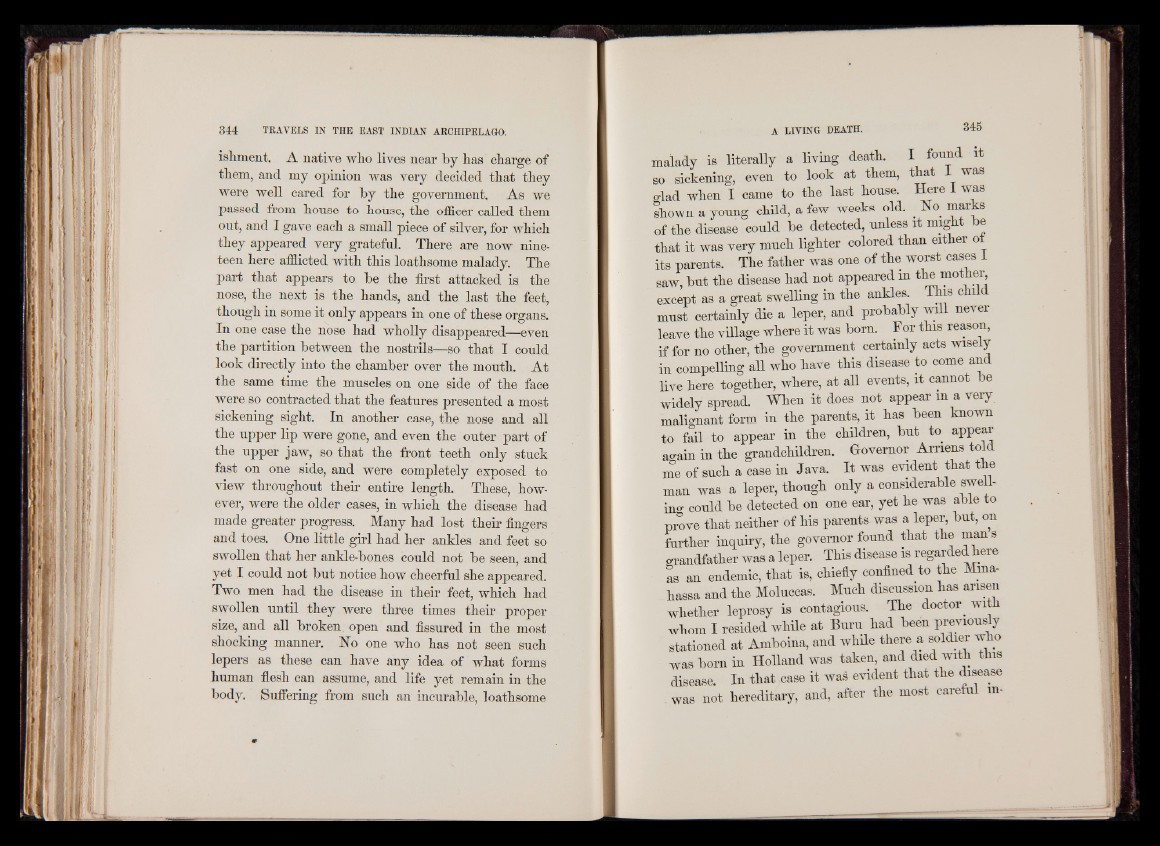
ishment. A native who lives near by has charge of
them, and my opinion was very decided that they
were well cared for by the government. As we
passed from house to house, the officer called them
out, and I gave each a small piece of silver, for which
they appeared very grateful. There are now nineteen
here afflicted with this loathsome malady. The
part that appears to be the first attacked is the
nose, the next is the hands, and the last the feet,
though in some it only appears in one of these organs.
In one case the nose had wholly disappeared—even
the partition between the nostrils—so that I could
look directly into the chamber over the mouth. At
the same time the muscles on one side of the face
were so contracted that the features presented a most
sickening sight. In another case, the nose and all
the upper lip were gone, and even the outer part of
the upper jaw, so that the front teeth only stuck
fast on one side, and were completely exposed to
view throughout their entire length. These, however,
were the older cases, in which the disease had
made greater progress. Many had lost their fingers
and toes. One little girl had her ankles and feet so
swollen that her ankle-bones could not be seen, and
yet I could not but notice how cheerful she appeared.
Two men had the disease in their feet, which had
swollen until they were three times their proper
size, and all broken open and fissured in the most
shocking manner. No one who has not seen such
lepers as these can have any idea of what forms
human flesh can assume, and life yet remain in the
body. Suffering from such an incurable, loathsome
malady is literally a living death. I found it
so sickening, even to look at them, that I was
glad when I came to the last house. Here I was
shown a young child, a few weeks old. : No^ marks
of the disease could be detected, unless it might be
that it was very much lighter colored than either o
its parents. The father was one of the worst cases I
saw, but the disease had not appeared in
except as a great swelling in the ankles. This child
must certainly die a leper, and probably will never
leave the village where it was bom. For this reason,
if for no other, the government certainly acts wisely
in compelling all who have this disease to come and
live here together, where, at all events, it cannot be
widely spread. When it does not appear in a very
malignant form in the parents, it has been known
to fail to appear in the children, but to appear
again in the grandchildren. Governor Amens told
me of such a case in Java. It was evident that the
man was a leper, though only a considerable swelling
could be detected on one ear, yet he was able to
prove that neither of his parents, was a leper, but, on
further inquiry, the governor found that the man s
grandfather was a leper. This disease is regarded here
as an endemic, that is, chiefly confined to the Mma-
hassa and the Moluccas. Much discussion has arisen
whether leprosy is contagious. The doctor^ wit
whom I resided while at Bum had been previously
stationed at Amboina, and while there a soldier who
was born in Holland was taken, and died with this
disease. In that case it was evident that the disea.se
was not hereditary, and, after the most careful m